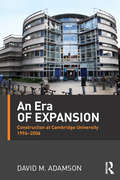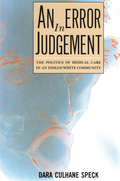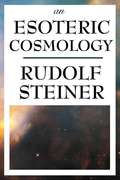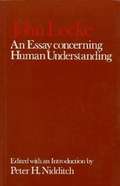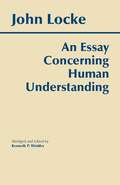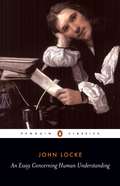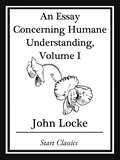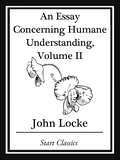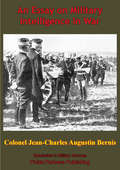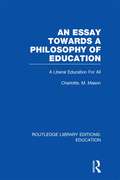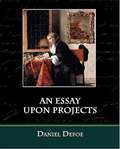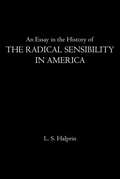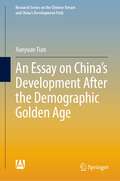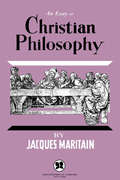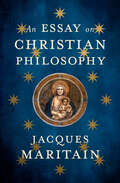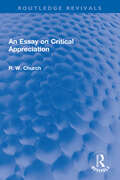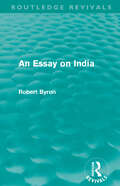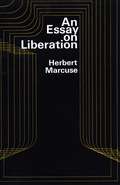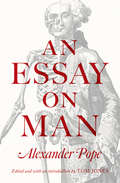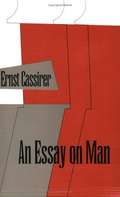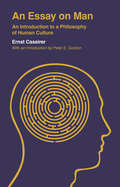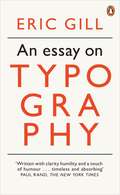- Table View
- List View
An Era of Expansion: Construction at the University of Cambridge 1996–2006
by David M. AdamsonChanging conditions in Higher Education and national funding regimes preceded a proliferation of construction projects in universities between 1996 and 2006. This book reviews a hundred projects between 1996 and 2006, and uses 9 detailed case studies from the author's time in charge of capital projects at the University of Cambridge to show us how these projects were conceived, argued for, designed, procured, managed, constructed, and passed on to building users. Readers with an interest in project management, estate management, University management, or the history of the University of Cambridge will find this fascinating and wide-ranging book to be uniquely valuable.
An Error in Judgement: The Politics of Medical Care in an Indian/White Community
by Dara Culhane SpeckON JANUARY 22, 1979, an eleven-year-old Native girl died of a ruptured appendix in an Alert Bay, B.C. hospital. The events that followed are chronicled here by Dara Culhane Speck, a member by marriage of the Nimpkish Indian Band in Alert Bay. She has relied mainly on interviews, anecdotes, and public records to describe how this small, isolated Native community took on the local hospital, the College of Physicians and Surgeons, provincial and federal ministries of health, and national media, because their private tragedy held implications that reached far beyond one child, one physician, one town, and even one century.
An Esoteric Cosmology
by Rudolf SteinerIt is only of recent times that the truths of occultism have been the subject of public lectures. Formerly, these truths were only revealed in secret societies, to those who had passed through certain degrees of initiation and had sworn to obey the laws of the Order through the whole of their life. Today, man is entering upon a very critical period. Occult truths are beginning to be disclosed to the public. In a matter of twenty years or so, a certain number of them will already be common knowledge. Why is this? The reason is that humanity is entering upon a new phase which it is the object of this lecture to explain.
An Essay Concerning Human Understanding
by John LockeA foundational text in Western philosophy, this essay discusses the ways in which humans develop and learn.
An Essay Concerning Human Understanding
by John Locke Peter H. NidditchPublished in 1689, John Locke's pioneering investigation into the origins, certainty, and extent of human knowledge set the groundwork for modern philosophy and influenced psychology, literature, political theory, and other areas of human thought and expression.
An Essay Concerning Human Understanding
by John Locke Kenneth P. WinklerIncludes generous selections from the Essay, topically arranged passages from the replies to Stillingfleet, a chronology, a bibliography, a glossary, and an index based on the entries that Locke himself devised.
An Essay Concerning Human Understanding
by John LockeIn An Essay Concerning Human Understanding, first published in 1690, John Locke (1632-1704) provides a complete account of how we acquire everyday, mathematical, natural scientific, religious and ethical knowledge. Rejecting the theory that some knowledge is innate in us, Locke argues that it derives from sense perceptions and experience, as analysed and developed by reason. While defending these central claims with vigorous common sense, Locke offers many incidental - and highly influential - reflections on space and time, meaning, free will and personal identity. The result is a powerful, pioneering work, which, together with Descartes's works, largely set the agenda for modern philosophy.
An Essay Concerning Humane Understanding, Volume I
by John LockeJohn Locke is widely regarded as the father of classical liberalism. This essay was groundbreaking in its approach to foundation of human knowledge and understanding, he describes the mind at birth as a blank slate filled later through experience, the essay became the principle sources of empiricism in modern philosophy and influenced many enlightenment philosophers. Many of the earliest books, particularly those dating back to the 1900s and before, are now extremely scarce and increasingly expensive.
An Essay Concerning Humane Understanding, Volume II
by John LockeJohn Locke is widely regarded as the father of classical liberalism. This essay was groundbreaking in its approach to foundation of human knowledge and understanding, he describes the mind at birth as a blank slate filled later through experience, the essay became the principle sources of empiricism in modern philosophy and influenced many enlightenment philosophers. Many of the earliest books, particularly those dating back to the 1900s and before, are now extremely scarce and increasingly expensive.
An Essay On Military Intelligence In War
by Colonel Jean-Charles-Augustin BernisJean-Charles Augustin Bernis was a French officer, he took part in the First and in the Second World Wars. Colonel of the French Army, Supreme Commandant of the Public Force (Force Publique) in 1936 -1940. He was active member of the French Resistance, one of the founders of the intelligence net "Alliance", led by Georges Loustaunau-Lacau and Marie-Madeleine Fourcade. Colonel Bernis was arrested in Monaco in the beginning of 1943. After the Second World War he was an active member of the veteran organizations of the French Resistance. Colonel Bernis was a theoretician of the military intelligence, author of the book "Le Service de Renseignement, le rôle et la méthode des 2èmes Bureaux en campagne" with the foreword of General Weygand, published 1934.In discussing the general question of military intelligence in time of war, the author starts from the undisputed premise that information of the enemy is absolutely essential and must be available in time for use. In any situation there are three factors involved; namely: 1.) the mission as laid down or deduced; 2.) the possibilities which our forces can execute; 3.) the possibilities which the enemy can execute. Colonel Bernis expertly illustrates his conception of how military intelligence should be handled by examples drawn from the Napoleonic Wars, Franco-Prussian War of 1870, and the First World War.
An Essay Towards A Philosophy of Education: A Liberal Education for All (Routledge Library Editions: Education)
by Charlotte M MasonThis was the last and most important and comprehensive work of Charlotte Mason, (founder of the Parents’ National Educational Union). For more than half a century the practical results of her original thought on education could be seen in all parts of the world in the Charlotte Mason Method and the Parents’ Union Schools.
An Essay Upon Projects
by Daniel DefoeDaniel Defoe was a writer, journalist and spy. He was one of the first authors to write a novel. <P> <P> In An Essay Upon Projects Defoe defines the word project and enlarges on the concept including looking at the economic ramifications of several projects he was personally familiar with. The Introduction sums up this first work by Defoe as follows. "It is practical in the highest degree, while running over with fresh speculation that seeks everywhere the well-being of society by growth of material and moral power. There is a wonderful fertility of mind, and almost whimsical precision of detail, with good sense and good humour to form the groundwork of a happy English style. Defoe in this book ran again and again into sound suggestions that first came to be realised long after he was dead. Upon one subject, indeed, the education of women, we have only just now caught him up. Defoe wrote the book in 1692 or 1693, when his age was a year or two over thirty, and he published it in 1697. "
An Essay for Ezra: Racial Terror in America (Thinking Theory)
by Grant FarredAn intensely personal, and philosophical, account of why white America&’s racial unconscious is not so unconsciousAn Essay for Ezra is a critique of terror that begins but by no means ends with the presidency of Donald J. Trump. A father addresses his son and a boy shares his observations in a dynamic dialogistic exchange that is a commentary of and for its time, taking the measure of racial terror and of white supremacy both in our moment and as a historical phenomenon.Framed through the experiences of the author&’s biracial son, An Essay for Ezra is intensely personal while also powerfully universal. Drawing on the social and political thought of James Baldwin and Martin Luther King, Grant Farred examines the temptation and the perils of essentialism and the need to discriminate—to engage the black mind as much as the black body. With that dialectic as his starting point, Farred engages the ideas of Jameson, Barthes, Derrida, Adorno, Kant, and other thinkers to derive an ethics of being in our time of social peril. His antiessentialist racial analysis is salient, especially when he deploys Dave Chappelle as a counterpoint to Baldwin—and Chappelle&’s brilliant comic philosophic voice jabs at both racial and gender identity.Standing apart for its willingness to explore terror in all its ambivalence, this theoretical reflection on racism, knowledge, ethics, and being in our neofascist present brings to bear the full weight of philosophical inquiry and popular cultural critique on black life in the United States.
An Essay in the History of the Radical Sensibility in America: Hawthorne, Melville, and Whitman
by L.S. HalprinHow do you use the word "radical?" Committed to the progressive? The cooperative? The communal? The equalitarian? In so far as social, political, and economic power is sought and wielded in malice, just so far is benevolence radical. The history of social, political, and economic power has been mostly the history of malice. The history of benevolence has been mostly the history of radicalism. The sensibility that loves benevolence has been a radical sensibility. In An Essay in the History of the Radical Sensibility in America, L.S. Halprin argues that before the middle of the nineteenth century the work of all American radicals was organized to defend some form of sentimental faith in millennial progress; that the work of the great writers of the middle of the nineteenth century was the first to be fundamentally free of the constraints of sentimentality; that despite that generation&’s accomplishments, the old sentimentalities have persisted, perpetuating the cycle in which illusions designed to make radicalism&’s chances seem better than they are become the disillusions which make them seem worse. Along the way, Halpern unfolds something of the contribution of Edgar Alan Poe, Nathaniel Hawthorne, Herman Melville, and Walt Whitman to the specific content of the radical sensibility in America. Since the middle of the nineteenth century, the radical&’s work has been primarily to accomplish political power. That work and the frustrations of it often leave little energy for the pursuit of a thoroughgoing self-awareness. Halperin's analysis is particularly useful now to remind readers of both the sentimentalities and the wisdoms from which we come.
An Essay on China’s Development After the Demographic Golden Age (Research Series on the Chinese Dream and China’s Development Path)
by Xueyuan TianThis book mainly addresses China’s current demographic situation and social people-related policies. It aims to solve the issues of demographic transition, population aging, population flow, urbanization, population quality, etc. China is the first large population country, with the vast territory and the huge economic system. It has many issues such as productivity and production relations, superstructure and economic base, and domestic and international relations in various fields and at all levels. Hence, China needs to come up with a set of overall strategies. The author sorts out all of his works in recent years and performs his new academic achievements on demographic issues and social governing strategies. This timely book offers new methods that impact advanced social development with real data.
An Essay on Christian Philosophy
by Jacques MaritainThis original translation, by Edward H. Flannery, brings you one of Maritain's most eye-opening studies of Christianity. Although not his most famous work, Maritain's An Essay on Christian Philosophy provides readers with an in-depth analysis and careful philosophical approach to the study of theology and, at the time of original publication, was considered to be the definitive statement of the Thomistic position. Discover his theses for yourself as Maritain considers the nature of philosophy, morality, and their relations to Christianity with clarity and a scholarly attention to detail. Flannery provides English readers with a glossary of terms to bring further understanding to Maritain's original words. Jacques Maritain was a French Catholic philosopher and political thinker. He was born in Paris in 1882, where he spent most of his life. His father was a prominent lawyer and his mother the daughter of a statesman. He attended the Sorbonne to study philosophy and natural science, and after marrying, he and his wife converted to Catholicism. It was after this he became a well-known scholar of St. Thomas Aquinas and Thomistic philosophy. He published widely on philosophical and political thought, and by the 1930s, he was an established thinker in the Catholic community. After the outbreak of WWII, Maritain relocated to the United States, where he taught at Princeton University and Columbia University. Later in life, he and his wife returned to France, where he continued to write and study Catholic scholarship until his death in 1973.
An Essay on Christian Philosophy
by Jacques MaritainThis important essay by the French Catholic philosopher articulates the foundation for his influential interpretations of Thomas Aquinas. Known for his influential writings that brought fresh relevance to the work of Thomas Aquinas, Jacques Maritain was one of the most important Catholic philosophers of the twentieth century. Although An Essay on Christian Philosophy is not generally considered to be among his major works, it is, in a sense, the key to unlocking his massive synthesis of modern Thomism. This provocative essay reveals the inner springs of Maritain&’s ideas concerning mankind&’s relationship to God. This lucid translation by Edward H. Flannery includes a glossary of technical terms, making it even more accessible for the general reader.
An Essay on Critical Appreciation (Routledge Revivals)
by Ralph W. Church dec'dFirst published in 1938, An Essay on Critical Appreciation aims to provide a language suited for the explication on beauty. This explication is not based merely on emotion but is motivated by contemplation and discrimination. By virtue of being rendered in a discourse, an appreciation can claim to be critical or discriminating and ‘beauty’ can be said to have characteristics. The search of such a language takes the author through the contemplation on the meaning of ‘beauty’, entertaining contrary views, and reaching at an understanding of the aesthetic situation. This book will be of interest to students of English literature, philosophy and art.
An Essay on India (Routledge Revivals)
by Robert ByronFirst published in 1931, Robert Byron’s Essay on India evaluates the state of colonial rule in India and analyses the contemporary problems facing the country. Based upon Byron’s travelling experiences within India in 1929 as a correspondent for the Daily Express, the work explores political factors more fully than in Byron's earlier writings, evaluating the successes and failures of British colonialism in the region.
An Essay on Liberation
by Herbert MarcuseIn this concise and startling book, the author of One-Dimensional Man argues that the time for utopian speculation has come. Marcuse argues that the traditional conceptions of human freedom have been rendered obsolete by the development of advanced industrial society. Social theory can no longer content itself with repeating the formula, "from each according to his ability, to each according to his needs," but must now investigate the nature of human needs themselves. Marcuse's claim is that even if production were controlled and determined by the workers, society would still be repressive--unless the workers themselves had the needs and aspirations of free men. Ranging from philosophical anthropology to aesthetics An Essay on Liberation attempts to outline--in a highly speculative and tentative fashion--the new possibilities for human liberation. TheEssay contains the following chapters: A Biological Foundation for Socialism?, The New Sensibility, Subverting Forces--in Transition, and Solidarity.
An Essay on Man
by Alexander Pope Tom JonesVoltaire called it "the most sublime didactic poem ever written in any language." Rousseau rhapsodized about its intellectual consolations. Kant recited long passages of it from memory during his lectures. And Adam Smith and David Hume drew inspiration from it in their writings. This was Alexander Pope's Essay on Man (1733-34), a masterpiece of philosophical poetry, one of the most important and controversial works of the Enlightenment, and one of the most widely read, imitated, and discussed poems of eighteenth-century Europe and America. This volume, which presents the first major new edition of the poem in more than fifty years, introduces this essential work to a new generation of readers, recapturing the excitement and illuminating the debates it provoked from the moment of its publication.Echoing Milton's purpose in Paradise Lost, Pope says his aim in An Essay on Man is to "vindicate the ways of God to man"--to explain the existence of evil and explore man's place in the universe. In a comprehensive introduction, Tom Jones describes the poem as an investigation of the fundamental question of how people should behave in a world they experience as chaotic, but which they suspect to be orderly from some higher point of view. The introduction provides a thorough discussion of the poem's attitudes, themes, composition, context, and reception, and reassesses the work's place in history. Extensive annotations to the text explain references and allusions.The result is the most accessible, informative, and reader-friendly edition of the poem in decades and an invaluable book for students and scholars of eighteenth-century literature and thought.
An Essay on Man: An Introduction to a Philosophy of Human Culture
by Ernst CassirerCassirer explores the question "what is man?" and explores man in terms of his human culture.
An Essay on Man: An Introduction to a Philosophy of Human Culture (Veritas Paperbacks)
by Ernst CassirerOne of the twentieth century&’s greatest philosophers presents the results of his lifetime study of man&’s cultural achievementsAn Essay on Man is an original synthesis of contemporary knowledge, a unique interpretation of the intellectual crisis of our time, and a brilliant vindication of man&’s ability to resolve human problems by the courageous use of his mind. In a new introduction Peter E. Gordon situates the book among Cassirer&’s greater body of work, and looks at why his &“hymn to humanity in an inhuman age&” still resonates with readers today. &“The best-balanced and most mature expression of [Cassirer&’s] thought.&”—Journal of Philosophy &“No reader of this book can fail to be struck by the grandeur of its program or by the sensitive humanism of the author.&”—Ernest Nagel, The Humanist &“A rare work of philosophy and a rare work of art.&”—Tomorrow
An Essay on Morals: A Science of Philosophy and a Philosophy of the Sciences
by Philip WylieA Science of PHILOSOPHY and a Philosophy of the SCIENCES "a Popular Explanation of the Jungian THEORY of HUMAN INSTINCT "a new Bible for the BOLD MIND and a Way to Personal Peace by LOGIC "the HERETIC'S HANDBOOK and Text for HONEST skeptics, including a Description of MAN suitable for an ATOMIC AGE" together with a compendium of MEANS TO BROTHERHOOD in a Better World" and a VOYAGE beyond the Opposite Directions of Religion and Objective truth, to UNDERSTANDING" -Front Cover
An Essay on Typography (Penguin Modern Classics)
by Eric GillEric Gill's opinionated manifesto on typography argues that 'a good piece of lettering is as beautiful a thing to see as any sculpture or painted picture'. This essay explores the place of typography in culture and is also a moral treatise celebrating the role of craftsmanship in an industrial age. Gill, a sculptor, engraver, printmaker and creator of many classic typefaces that can be seen around us today, fused art, history and polemic in a visionary work which has been hugely influential on modern graphic design.'Written with clarity, humility and a touch of humour . . . timeless and absorbing' Paul Rand, The New York Times'His lettering was clear, confident and hugely influential on the development of modern type design. The world has now caught up with Gill' GuardianHow do we see the world around us? This is one of a number of pivotal works by creative thinkers like John Berger and Susan Sontag whose writings on art, design and the media have changed our vision for ever.
